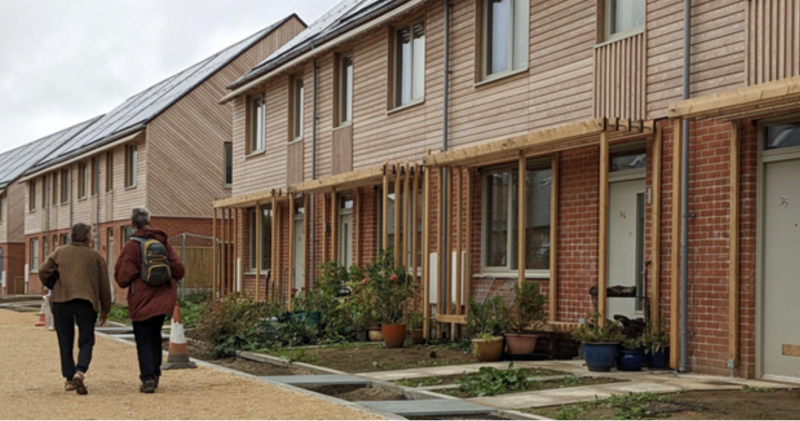Pioneering a green energy revolution
A winning partnership comprising Bridport Cohousing, BCHA, Clean Energy Prospector and Bristol Energy Cooperative has resulted in the construction of a microgrid system for Hazelmead (Bridport Cohousing’s developing neighbourhood) that will act as a benchmark for housing developments nationwide, championing the provision of clean, green, locally generated energy for residents. To date, this is the largest community microgrid in the UK.
One of the most striking features at the development is the giant photovoltaic (solar) panels that cover much of the roof spaces, with sustainable power generated by every home stored on-site in a high-capacity shared battery and redistributed for all customers.
The immense capacity of this giant battery will help meet residents’ power needs even when the sun isn’t shining, with the system tailored to maximise the use of renewably generated, carbon-free energy by storing surplus solar power and enabling the purchase of top-up wind power from other suppliers. The system will power electric heating, when needed, at homes across Hazelmead, with hot water supplied by air-source heat pumps. The super-insulated homes also retain warmth from the sun, reducing the need for active heating.
With fossil fuel-powered boilers set to be banned in new-build homes as early as 2025 under government proposals, Hazelmead’s commitment to clean energy eliminates the need for polluting gas or oil-fired boilers, which power the majority of the 95% of centrally heated UK homes.
Not only is Hazelmead’s microgrid kinder to the environment, but it’s gentler to residents’ wallets, too. A market-leading introductory rate for electricity of just 16.5 pence per kWh is fixed until March 2024, keeping bills low at a time of spiralling energy costs. In contrast, a leading national supplier of renewable energy was charging 32.23 pence per kWh at the time of writing, with prices predicted to rise by more than 50 per cent in April 2023.
Bridport Cohousing has even set an ambitious target of reducing the community’s carbon footprint by 40% over the first five years of living at Hazelmead.
Class-leading levels of home insulation
The cost of keeping homes warm during winter – and the environmental impact of doing so – is high on the political agenda as the climate and energy crisis deepens.
Buildings are one of the largest contributors of carbon emissions and are claimed to be accountable for 35% of global energy consumption. Hazelmead is proof that homes of the future can harness the power of the latest insulation technology to keep properties cosy without placing a burden on the planet.
The super-insulated properties under construction at Hazelmead have been designed to meet standards set by the Association for Environment Conscious Building (AECB), a network of companies and individuals with the common aim of promoting sustainable construction. The timber-framed homes are insulated to near PassivHaus levels of insulation and clad with brick and sustainably sourced timber. This independent international design standard is only awarded to properties that slash energy use while delivering high standards of comfort and health.
Because properties at Hazelmead have been designed as almost airtight environments for maximum efficiency, they are equipped with Mechanical Ventilation with Heat Recovery (MVHR) systems. These bring fresh air into homes while recovering waste heat from stale air which is pumped out. Cohousing homes are also slightly smaller than average, to avoid the energy costs of heating spare rooms. Residents will not need spare bedrooms, because visitors will be able to hire guest bedrooms on site.
Horticultural havens champion biodiversity and food security
With Hazelmead set in an Area of Outstanding Natural Beauty (AONB) and built on former farmland, creating a biodiverse habitat for birds, reptiles and mammals is at the heart of the development.
Common areas will be planted with native trees, while sparrow and swift boxes are being attached to the terraced houses. Larger trees have bat boxes added, while a wildflower meadow and fruit orchard will become a haven for beneficial pollinators. A commitment to organic gardening and the principles of permaculture (meeting human needs while enhancing biodiversity and reducing our impact on the planet) will ensure that land is cultivated in tune with nature.
Providing residents with access to land for cultivating food is integral to Hazelmead’s vision of cutting food miles. In November 2022, food price inflation hit a record 14.7%, driving up the cost of the average bill by £682 per year, according to figures from analysts Kantar Worldpanel. Dedicated grow-your-own food areas will help residents to reduce their shopping bills and carbon footprints.
Bridport Cohousing’s Lin Scrannage says: “All houses have community growing beds at the rear and we will use these areas to grow food for shared meals in the Common House. This is equivalent to the area of two double tennis courts. We also have two full-size allotment plots off-site, where residents can garden together. We are planning to bulk-buy fresh organic vegetables and food staples from local suppliers, which will cut food bills for residents and reduce food miles.”

Lin adds: “Bridport Cohousing worked with the landscape contractor to ensure that trees and shrubs at Hazelmead will be productive, edible varieties that benefit residents and wildlife. Street trees include 12 cherries, a mulberry, four walnuts and nine Chilean guavas. We are planting an orchard on the land this autumn which will include varieties such as Adam’s Pearmain and Egremont Russet apples, as well as Angelina Burdett plums.”
Composting and recycling forms a key part of Hazelmead’s waste management strategy, and residents commit to giving some hours each week for neighbourhood work, such as gardening and managing the composting system. A policy of ‘reduce, reuse and recycle’ will influence all decisions.
Driving change in eco-friendly travel
Car-free streets at Hazelmead will enable pedestrians to move around more freely and provide safe spaces for children to play. Parking provision is in dedicated parking areas (with one space per household), and will include charging points for electric vehicles, along with secure, dry storage for bicycles.
Bridport Cohousing is in talks with Co Cars in Exeter to set up an e-car club, in addition to informal car share arrangements among residents. A focus on cycling and e-bikes will ensure that opportunities to maximise the use of pedal power are realised, driving a new culture of sustainable, climate-friendly travel.


